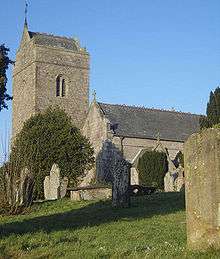Brigham, Cumbria
| Brigham | |
 The former Wheatsheaf Inn public house, Brigham |
|
 Brigham |
|
| Population | 756 (2011 census)[1] |
|---|---|
| OS grid reference | NY085303 |
| Civil parish | Brigham |
| District | Allerdale |
| Shire county | Cumbria |
| Region | North West |
| Country | England |
| Sovereign state | United Kingdom |
| Post town | COCKERMOUTH |
| Postcode district | CA13 |
| Dialling code | 01900 |
| Police | Cumbria |
| Fire | Cumbria |
| Ambulance | North West |
| EU Parliament | North West England |
| UK Parliament | Workington |
Coordinates: 54°39′29″N 3°24′58″W / 54.658°N 3.416°W
The village of Brigham, near the town of Cockermouth, Cumbria, England, has existed as a settlement since neolithic times.
History
Brigham was an early centre of Christianity in Cumbria. The church of St Bridget's, was originally a Norman building, and is situated at the far north of the village, known as Low Brigham; it contains several fragments of pre-Norman crosses and other early carved stones. A disused quarry is situated in the centre of the village, above which runs the main street of High Brigham. The quarry is bisected by the road called Stang Lonning.
Until the closure of the Cockermouth and Workington Railway in 1966, Brigham had a railway station. At one time there was also a second station serving the hamlet of Broughton Cross, 1 km west of the main village.
The village gave its name to HMS Brigham, a Ham class minesweeper. The ship's bell from this vessel is now in St Bridget's Church of England primary school in the village. Until a more modern fire alarm system was installed, this bell was rung as the fire alarm for the school.
The family of Bounty mutineer Fletcher Christian are buried in the graveyard at St. Bridget's. Fletcher himself, born and raised in the township of Eaglesfield within Brigham parish, and christened at St. Bridget's, is thought to be buried on Pitcairn Island, though some have claimed that he returned secretly to England.
Community
The village has its own Church of England primary school, St. Bridget's, with just over 100 pupils. There is no longer a Post Office in Brigham, though there is still a village store, a hairdressing salon and a social club. Brigham used to have 3 local pubs which all have now been transformed into houses. Newer housing estates known as High Rigg and The Hill are at the west and east of the village.
Etymology
'Brigham' is 'homestead near the bridge'. 'Brycg' is OE (Old English) for 'bridge'; 'hām' is OE for 'village', 'homestead'. [2]
Surnames
Most common surnames in Brigham at the time of the United Kingdom Census of 1881,[3] by order of incidence:
- 1. Graham
- 2. Robinson
- 3. Watson
- 4. Moore
- 5. Hodgson
- 6. Walker
- 6. Black
- 8. Thompson
- 9. Fox
- 10. Harrison
- 10. Bell
See also
References
- ↑ "Parish population 2011". Retrieved 16 June 2015.
- ↑ Armstrong, A. M.; Mawer, A.; Stenton, F. M.; Dickens, B. (1950). The place-names of Cumberland. English Place-Name Society, vol.xxi. Part 2. Cambridge: Cambridge University Press. p. 355.
- ↑ Most Common Surnames in Brigham
Further reading
David Bradbury (compiler), "Pages From Brigham's History" Whitehaven, Past Presented (2008) ISBN 978-1-904367-33-8
External links
- Cumbria County History Trust: Brigham (nb: provisional research only - see Talk page)
 Media related to Brigham, Cumbria at Wikimedia Commons
Media related to Brigham, Cumbria at Wikimedia Commons
